Toddler Night Terrors: Causes, Symptoms, and Treatments
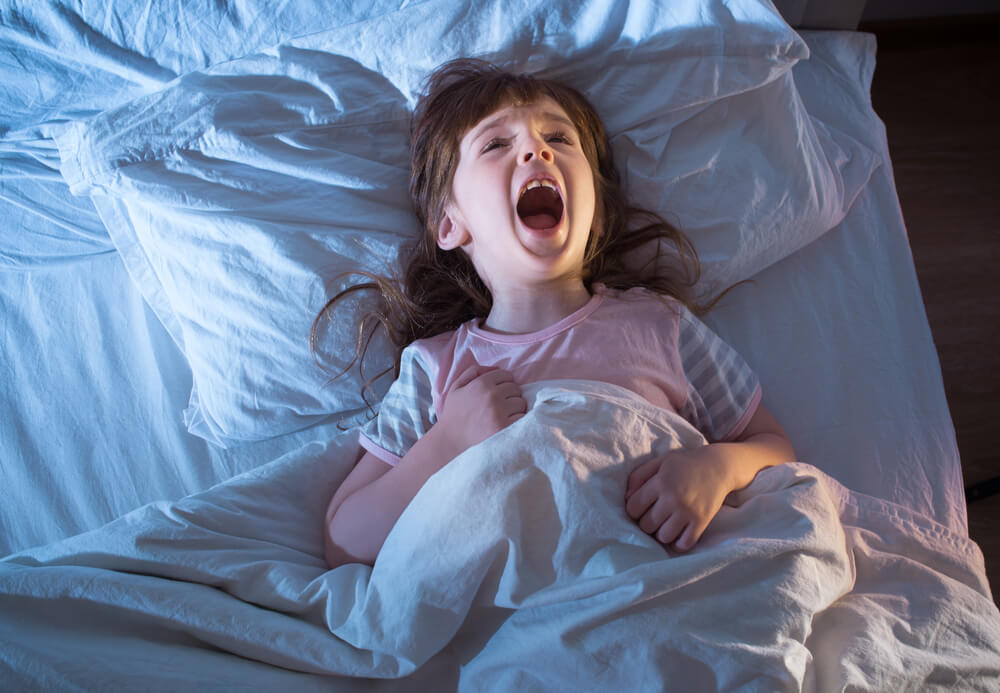
Night terrors in toddlers can be especially disruptive for families. They’re similar to nightmares but more intense for parents to witness. That’s not to mention the fear they provoke in little ones. Learn how to recognize a night terror and what to do about this type of sleep episode when it does strike.
Contents:
- What Are Night Terrors?
- Causes of Nightmares and Night Terrors in Children
- Night Terrors in Children: Signs and Symptoms
- Helping Toddlers With Night Terrors
What Are Night Terrors?
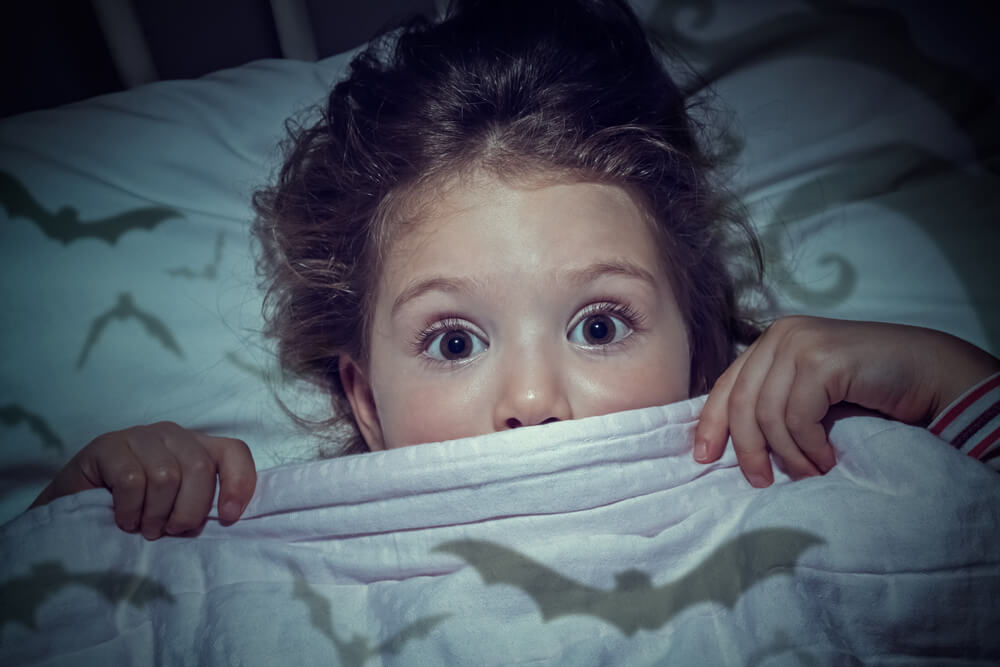
Morrowind/Shutterstock.com
Childhood can be a scary time, no doubt. Night terrors certainly don’t help. But what is a night terror, exactly? Night terrors are specific sleep disturbances that affect children. Although adults can experience night terrors, it’s rare.
Most night terrors happen between the age of three and eight years old.
Night terrors in babies are uncommon. And by the teen years, night terrors have usually become a thing of the past for the vast majority of children.
Night Terrors Definition
By definition, night terrors are sleep episodes characterized by intense fear along with crying or screaming and thrashing about. They are not to be confused with nightmares, and luckily, they are not usually harmful (though they can be disturbing for kids and parents).
When Do Night Terrors Start?
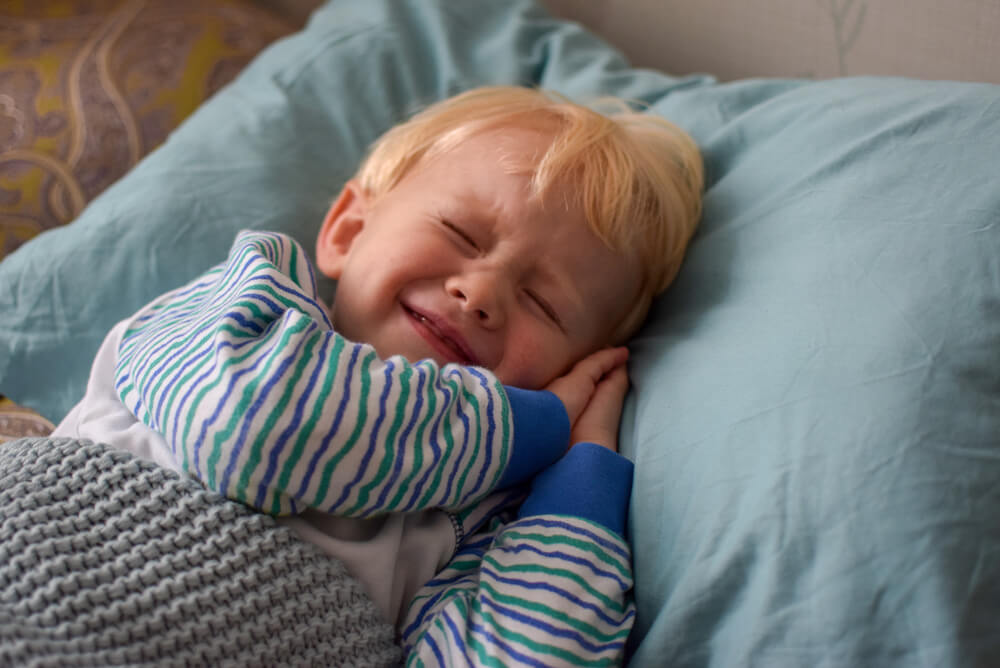
klioli/Shutterstock.com
Night terrors can happen at any time during the night. Most often, though, they occur during deep sleep. For your toddler, this will usually be early in the evening. It’s not uncommon for some children to have more than one night terror in a single night.
Night Terror or Nightmare: What’s the Difference?
It’s easy to group night terrors and nightmares together, but they are actually quite different. Night terrors differ from bad dreams in that they usually happen when a child’s eyes are open. Parents may mistake this as a sign that their kids are awake. With night terrors, though, children are literally sleeping with their eyes open.
Another difference between nightmares and night terrors is that a child will often remember a nightmare whereas they will have no recollection of a night terror. Nightmares also tend to happen later in the night during REM sleep. This is why it’s easier to wake a child from a nightmare than it is a night terror.
Causes of Nightmares and Night Terrors in Children

Andrey Sayfutdinov/Shutterstock.com
While some of the causes of nightmares and night terrors overlap, many are distinct from one another.
Causes of Nightmares
For an infant or toddler, nightmares are usually caused by the same factors that trigger bad dreams in older children and even adults. Watching a horror movie, for instance, or listening to a scary story, can incite fear that lingers after bedtime. Being excessively tired or experiencing a lot of stress during the day can also bring about a nightmare once the lights are out.
Causes of Night Terrors

Jes2u.photo/Shutterstock.com
The list of potential causes of night terrors is lengthy. Thus, it can be hard to pin down exactly what’s causing your child to experience these types of sleep episodes. Here are some of the most common night terror triggers:
- caffeine;
- not enough sleep;
- stress;
- anxiety;
- depression;
- fever;
- sleep apnea;
- restless leg syndrome;
- certain medications;
- sleeping away from home.
Some experts say night terrors can occur without any specific reason at all.
Night Terrors in Children: Signs and Symptoms
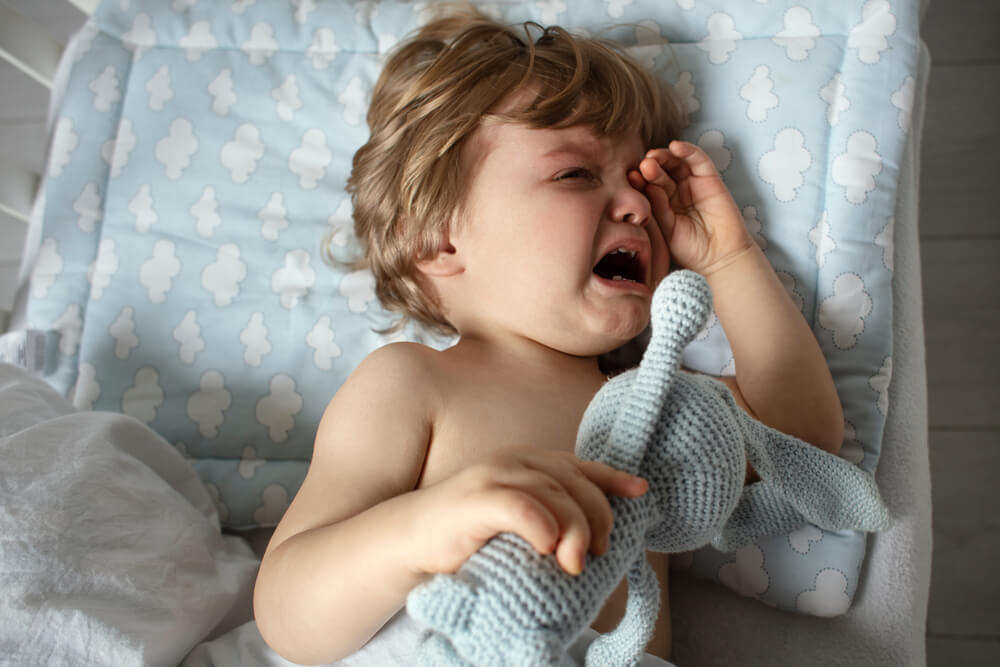
Nick Fedirko/Shutterstock.com
When your child bolts upright in the middle of the night and lets out an ear-piercing scream for no apparent reason, you’ll know something is wrong. But how can you tell if your toddler is having a nightmare, night terror, or something else? Here are some of the signs and symptoms of night terrors in young children:
- Screaming or crying uncontrollably.
- Fear and confusion.
- Being inconsolable.
- Shaking and flailing.
- Kicking or punching.
- Sleepwalking or running.
- Hyperventilating.
- Dilated pupils.
- Increase in heart rate
Helping Toddlers With Night Terrors
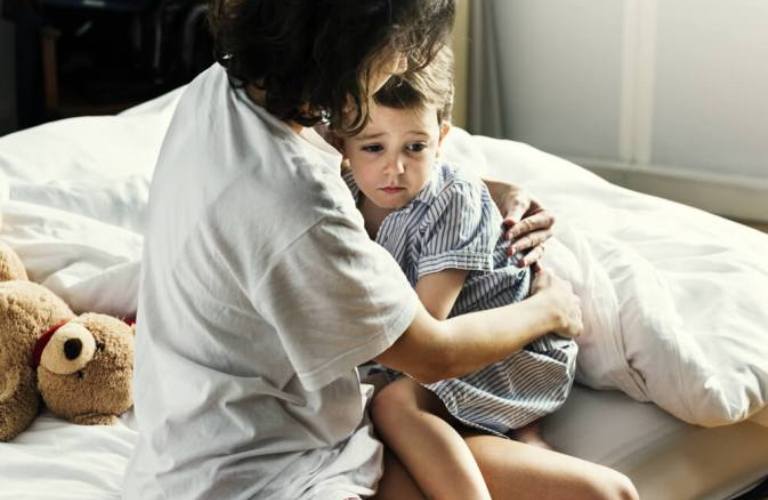
Rawpixel.com/Shutterstock.com
A parent’s first inclination when they see their child in distress is to render help. Helping your little one with a night terror may require a specific and targeted approach, though.
Can You Stop a Night Terror?
Perhaps one of the most frustrating parts of watching your child experience a night terror is that there’s really nothing you can do to stop it from happening. If you’ve ever tried to wake a child up during one of these sleep episodes, then you already know it’s nearly impossible to do.
Plus, if you do wake them while they’re having a night terror, they’re likely to become even more upset and confused. The best thing to do is ride out the storm until it passes on its own. Most night terrors only last a few minutes, though they can go on for longer. After the episode has passed, it can take another half hour or so for your child to calm down completely and go back to sleep.
When to Call a Doctor for Night Terrors?

kryzhov/Shutterstock.com
The first time you see your child experiencing a night terror, you may go into panic mode. With all the screaming and flailing about, it might seem like an emergency situation. You’ll definitely want to make it stop immediately and by any means necessary!
Fortunately, night terrors are more frightening than they are dangerous. In fact, there’s usually no reason to ring the pediatrician.
If night terrors last more than half an hour or become a regular problem, then getting to the underlying cause may be worthwhile, though. Having a doctor intervene could also calm parents’ anxieties about their children’s health and well-being.
Night Terror Treatment

TommyStockProject/Shutterstock.com
Though you may not be able to stop a night terror once it’s begun, there are some home remedies, including things you can do to help your child endure this sleep disturbance.
Hold on Tight (But Not Too Tight)
Since it’s common for children to try to get up out of bed and run or walk during a night terror, it’s wise for parents to hold kids until the episode subsides. If you try to restrain them too much, they might fight back by pushing, kicking, or even punching, though. Thus, a gentle approach is usually best.
Pick Up Toys Before Bedtime
It’s also a good idea to keep your child’s room tidy just in case they have a night terror and get out of bed before you can attend to them. Anything that could cause your toddler to trip and fall should be put away before bedtime. Remember, safety first!
Night Terror Prevention

LeManna/Shutterstock.com
At their worst, night terrors can continue to haunt children into their preteens. And every parent who has ever witnessed a night terror will tell you the same thing: they never want to see one again. Luckily, there are some strategies for night terror prevention that parents can use to get rid of these sleep disturbances, if not altogether, then at least more often than not. Here are some things you can try.
Establish a Sleep Routine
If you haven’t already, now is a good time to establish a regular sleep routine for your child. Children who go to bed at the same time each night and wake up at the same time each morning may struggle less with sleep problems like night terrors.
Plus, anything you can do to calm your child before bed may reduce the likelihood of a night terror. This might mean bedtime stories, cuddles, calming music, or all of the above!
Avoid Caffeine
Like adults, children should avoid caffeine in the late afternoons and evenings. If night terrors persist, consider cutting caffeine out of your child’s diet altogether. Caffeine can cause insomnia and anxiety, which only worsens night terrors.
Try Timed Awakening
Children who have regular night terrors may benefit from a night terror prevention technique known as timed awakenings. To use this method, you’ll need to make note of what time of night your child is having night terrors and then look for a pattern. If there is one, you can try waking your toddler 15 minutes before a night terror is likely to occur. After five minutes or so, put your child back to bed. This technique has been shown to prevent night terrors in some children.
Other remedies you can try include removing stressors from your child’s daily routine, getting rid of any sources of noise that could wake them up at night (like electronic toys), and ensuring toddlers get enough sleep each night.
The Reality of Night Terrors
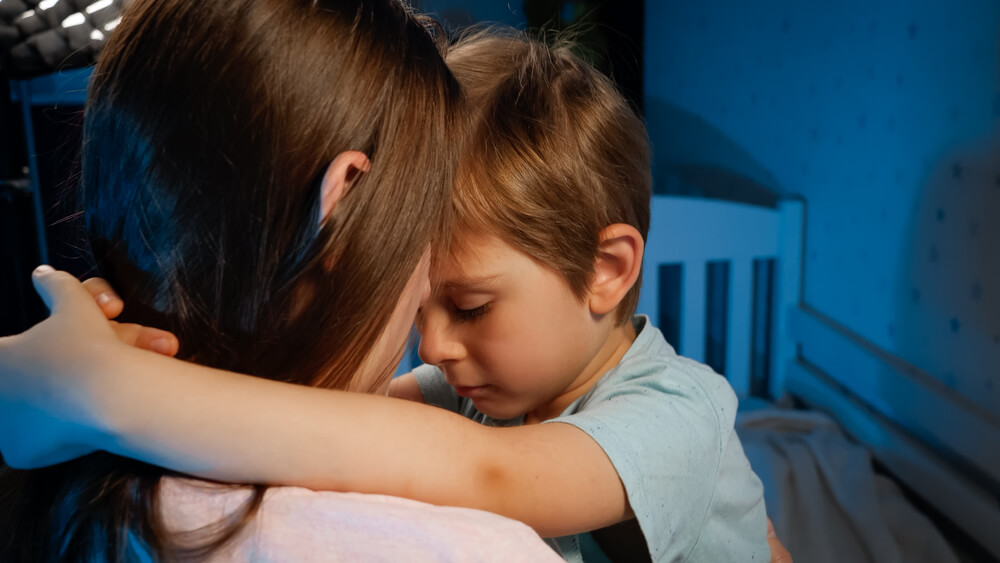
kryzhov/Shutterstock.com
They may sound like something from a horror movie, but night terrors are very real. And even though they pose little if any physical threat to your child, they can still cause strong emotional reactions like frustration, sadness, and fear in children and their parents. They can also disrupt the family routine and cause everyone to lose sleep. Use the information above to soothe these sleep disturbances in your home.
Does your child have night terrors? How do you deal with them? Share your observations and experiences with our parenting community by commenting below.
The picture on the front page: EKramar/Shutterstock.com
Проверьте электронный ящик



















